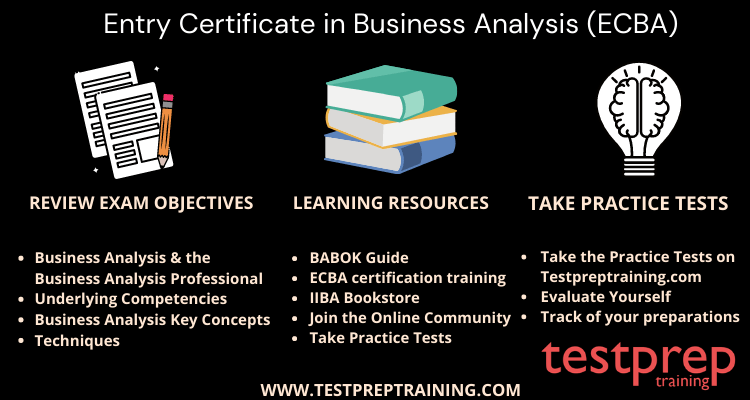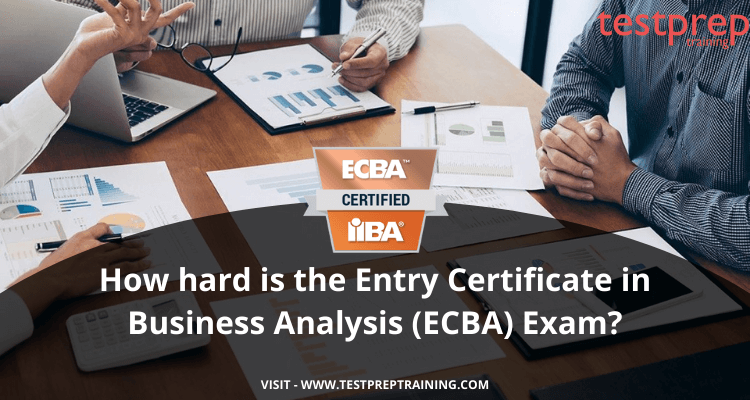The Entry Certificate in Business Analysis (ECBA) is a certification exam offered by the International Institute of Business Analysis (IIBA) for individuals who are new to the field of business analysis or looking to enhance their career prospects in this domain. The ECBA certification exam tests candidates on the fundamental concepts and skills required for business analysis, including knowledge areas like business analysis planning and monitoring, elicitation and collaboration, requirements lifecycle management, strategy analysis, and solution evaluation.
Entry Certificate in Business Analysis ECBA Exam Glossary
- Business analysis – The practice of enabling change in an enterprise by defining needs and recommending solutions that deliver value to stakeholders.
- Stakeholder – Any individual or group who has an interest in or is affected by a business analysis initiative.
- Requirements – Descriptions of the capabilities, qualities, and characteristics that a solution must possess to meet the needs of the stakeholders and the enterprise.
- Requirements elicitation – The process of discovering and documenting stakeholder needs and requirements.
- Use case – A description of how a user interacts with a system to achieve a specific goal.
- Agile – An iterative approach to project management and software development that emphasizes flexibility, collaboration, and customer satisfaction.
- Waterfall – A traditional project management methodology that involves a sequential, linear approach to project execution.
- SWOT analysis – An assessment of an organization’s strengths, weaknesses, opportunities, and threats.
- Business case – A document that justifies the need for a particular business initiative by outlining its expected benefits, costs, risks, and constraints.
- Feasibility study – An analysis of the technical, economic, and organizational viability of a proposed business initiative.
- Root cause analysis – A problem-solving technique that involves identifying the underlying causes of a problem.
- Data analysis – The process of inspecting, cleansing, transforming, and modeling data to discover useful information, draw conclusions, and support decision-making.
- UML – Unified Modeling Language, a standard visual modeling language used in software engineering to create diagrams that represent various aspects of a system.
- BPMN – Business Process Model and Notation, a graphical notation used to represent business processes.
- IIBA – International Institute of Business Analysis, a professional association for business analysts that offers certification programs and other resources.
- BABOK – Business Analysis Body of Knowledge, a guidebook published by IIBA that outlines best practices and techniques for business analysis.
Entry Certificate in Business Analysis ECBA Exam Guide
Here are some official resources for the Entry Certificate in Business Analysis (ECBA) Exam:
- IIBA Certification Handbook: The handbook provides information about the ECBA certification process, exam format, and other details. You can download it from the IIBA website.
- ECBA Exam Blueprint: This document outlines the knowledge areas and tasks that are covered in the ECBA exam. It can be accessed on the IIBA website.
- ECBA Exam Study Guide: The study guide provides an overview of the ECBA certification and exam, as well as tips for preparing for the exam. It can be downloaded from the IIBA website.
- ECBA Online Study Course: This is an online course offered by IIBA that covers all the knowledge areas required for the ECBA exam. It includes interactive lessons, practice quizzes, and a final exam.
- ECBA Exam Simulator: The ECBA Exam Simulator is a tool that allows you to practice taking the ECBA exam in a simulated environment. It is offered by Watermark Learning and can be purchased on their website.
- IIBA Community: The IIBA community is an online forum where you can connect with other business analysts, ask questions, and share information about the ECBA exam.
Entry Certificate in Business Analysis ECBA Exam Tips and Tricks
Here are some tips and tricks to prepare for the Entry Certificate in Business Analysis (ECBA) Exam:
- Understand the exam format: The ECBA exam is a multiple-choice exam with 50 questions. You will have 1 hour to complete the exam, and you need to score at least 50% to pass.
- Get familiar with the BABOK Guide: The exam questions are based on the Business Analysis Body of Knowledge (BABOK) Guide. Study the guide carefully and make sure you understand the concepts and terminologies used.
- Take practice exams: There are many practice exams available online that can help you prepare for the ECBA exam. These exams can give you an idea of the type of questions you will encounter and help you identify areas where you need to focus more.
- Join a study group: Joining a study group can help you learn from others and get answers to your questions. You can also share your knowledge and help others in the group.
- Use flashcards: Flashcards can be a useful tool to help you memorize definitions, concepts, and terminologies. You can create your own flashcards or use online resources.
- Focus on your weak areas: Identify your weak areas and focus more on those areas during your preparation. Spend extra time studying those areas and taking practice exams.
- Manage your time effectively: Create a study schedule and manage your time effectively. Make sure you give enough time to each topic and take regular breaks to avoid burnout.
- Stay motivated: Stay motivated throughout your preparation and focus on your goal of passing the ECBA exam. Celebrate small successes along the way to keep yourself motivated.
Entry Certificate in Business Analysis ECBA Exam Outline
Entry Certificate in Business Analysis ECBA exam blueprint covers the following topics –
Business Analysis Knowledge
Business analysis and the BA professional (2.5%)
(IIBA Documentation: What types of Business Analysis Certification are available?)
- Understands what business analysis is
- Understands who a business analysis professional is
Underlying competencies (5%)
(IIBA Documentation: A Guide to Developing a Training Plan for Advancing Business Analysis Competencies)
- Understands analytical thinking and problem solving
- Understands behavioral characteristics
- Understanding business knowledge
- Understands communication skills
- Understanding interaction skills
- Understands tools and technology
Business analysis of key concepts (5%)
(IIBA Documentation: BACCM Overview – The Core Concepts Business Analysis Core Concept Model)
- Understands The Business Analysis Core Concept Model
- Understands key terms
- Understanding requirements classification schema
- Understands stakeholders
- Understands requirements and designs
Techniques (12.5%)
- Understand the techniques and recognize the key elements of the competency and why they are important. However, it is not expected to have the experience nor skill level to act upon the competency.
BABOK Guide Knowledge Areas
Business analysis planning and monitoring (5%)
(IIBA Documentation: Business Analysis Planning and Monitoring)
- Plan Business Analysis Approach
- Plan Stakeholder Engagement
- Planning Business Analysis Governance
- Plan Business Analysis Information Management
- Identify Business Analysis Performance Improvement
Elicitation and collaboration (20%)
(IIBA Documentation: Elicitation and Collaboration)
- Prepare for Elicitation
- Conduct Elicitation
- Confirm Elicitation Results
- Communicate Business Analysis Information
- Manage Stakeholder Collaboration
Requirements life cycle management (20%)
- Trace Requirements
- Maintain Requirements
- Prioritize Requirements
- Assess Requirements Changes
- Approve Requirements
Strategy analysis (5%)
(IIBA Documentation: Strategy to Execution Framework)
Requirements analysis and design definition (24%)
(IIBA Documentation: Requirements analysis and design definition)
- Specify and Model Requirements
- Verify Requirements
- Validate Requirements
- Define Requirements Architecture
- Define Design Options
- Analyze Potential Value and Recommend Solution
Solution evaluation (1%)
(IIBA Documentation: Solution evaluation)
Confused with “How to study for ECBA Exam?” Use the Study Guide!
How difficult is the Entry Certificate in Business Analysis ECBA exam?
The ECBA Certification is in a league of its own. Given the ECBA exam format and topics, it can be said that this exam can be a tough task to clear. Your intelligence and business understanding will be put to test for an hour with 50 conceptual questions that can be tricky at times. To earn this certification, it is important to prepare with will and determination. Also, you can not ignore the importance of quality study resources. To help you, we have listed the best and most authentic resources that you can use to prepare for this exam.
Entry Certificate in Business Analysis ECBA Exam Study Guide
The ECBA exam can be very challenging, and, naturally, you may feel overwhelmed by the sheer amount of content to cover. While you will never be able to know everything, here are a few resources professionals recommended to help you in the ECBA exam preparation. Have a look here!

IIBA Official Website
The official IIBA site is the most comprehensive source of material that you need to study. The official site provides you with an overview of what is covered in the exam, the latest blogs and news, a glossary of terms, resources for in-depth information on various topics, and sample questions to help you refine your knowledge. Hence, you must visit it regularly for all the updates and information.
Join ECBA Training
ECBA trainings have been a popular format of learning infrastructure. These courses are an interactive way of teaching and learning. Here, you can get all your queries instantly answered by the instructors. These instructors are experts in their field with years of experience. With their knowledge and experience, it will be easier for you to comprehend the contents of the course. For more details, you can visit the official website.
ECBA Online tutorials
You can check our online tutorial for the Entry Certificate Business Analyst exam where we have covered all the details of the exam comprehensively. It can help you in a better understanding of the ECBA exam format and other details. These tutorials also discuss the steps to register for the exam, prerequisites, and exam policies. Thus, you can get all-around information on one page.
Prepare with ECBA Practice Tests
Taking practice tests is the best way of knowing how well you are doing in each subject. This will help you in finding out which topics you should brush up on before the exams. These tests are made by putting together ECBA exam practice questions that are similar to the ones asked in the exams. Thus, you will gain experience with each ECBA practice exam test. All these efforts combined will help you in facing the exam with confidence and passing it easily. Test yourself now with ECBA practice exam free practice quiz!



